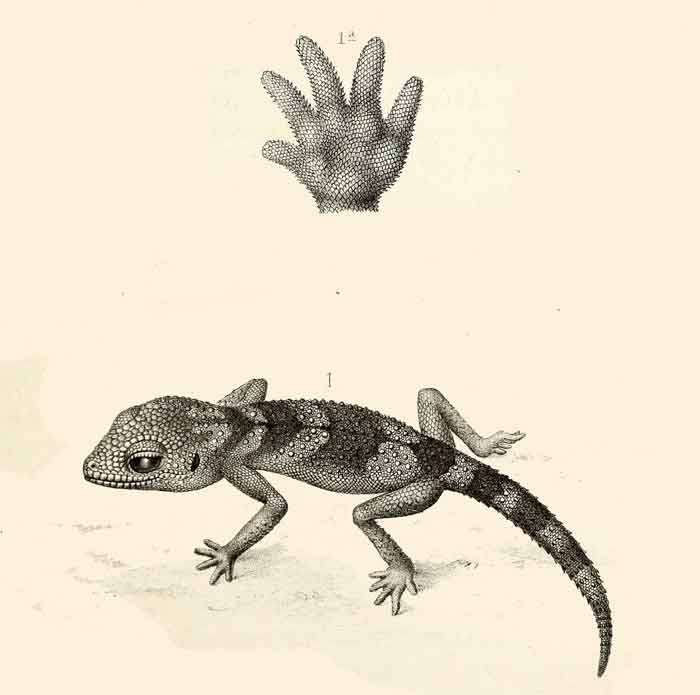
Chondrodactylus angulifer
Superregnum: Eukaryota
Regnum: Animalia
Subregnum: Eumetazoa
Cladus: Bilateria
Cladus: Nephrozoa
Superphylum: Deuterostomia
Phylum: Chordata
Cladus: Craniata
Subphylum: Vertebrata
Infraphylum: Gnathostomata
Superclassis: Tetrapoda
Cladus: Reptiliomorpha
Cladus: Amniota
Classis: Reptilia
Cladus: Eureptilia
Cladus: Romeriida
Subclassis: Diapsida
Cladus: Sauria
Infraclassis: Lepidosauromorpha
Superordo: Lepidosauria
Ordo: Squamata
Subordo: Gekkota
Infraordo: Gekkomorpha
Superfamilia: Gekkonoidea
Familia: Gekkonidae
Subfamilia: Gekkoninae
Genus: Chondrodactylus
Species: C. angulifer
Subspecies: C. a. angulifer – C. a. namibensis
Name
Chondrodactylus angulifer Peters, 1870
Type locality: Calviniadistrict, Oorlogsriver (= Northern Cape Province, Republic of South Africa).
Holotype: ZMB 6750A .
Synonyms
Chondrodactylus weiri Boulenger, 1887

References
Peters, 1870. Beitrag zur Kenntnis der herpetologische Fauna von Südafrika. Monatsber. K. Preuss. Akad. Wiss., Berlin 1870: 110–115.
Chondrodactylus angulifer at the New Reptile Database
Distribution
Republic of South Africa, Namibia, Botswana
Vernacular names
English: Namib Giant Ground Gecko
Chondrodactylus angulifer, also known as the common giant ground gecko, the South African ground gecko, or the Namib sand gecko, is a species of gecko, a lizard in the family Gekkonidae. The species is endemic to southern Africa.
Geographic range
C. angulifer is found in Namibia, southernmost Botswana, and western South Africa.[2]
Description
C. angulifer is a large gecko. Adults average 7 to 9 cm (2.8 to 3.5 in) snout-to-vent length (SVL). The record size is a male 11.3 cm (4.4 in) SVL.[3]
Reproduction
An adult female C. angulifer may lay a clutch of one or two eggs. The eggs are almost spherical, 18 by 16 mm (0.71 by 0.63 in). Each hatchling is approximately 7 cm (2.8 in) total length (including tail).[3]
Subspecies
There are two subspecies which are recognized as being valid, including the nominotypical subspecies.[2]
Chondrodactylus angulifer subsp. angulifer W. Peters, 1870
Chondrodactylus angulifer subsp. namibensis Haacke, 1976
References
Tolley, K.A.; Alexander, G.J. (2021). "Chondrodactylus angulifer". IUCN Red List of Threatened Species. 2021: e.T178743A120635185. doi:10.2305/IUCN.UK.2021-2.RLTS.T178743A120635185.en. Retrieved 18 November 2021.
"Chondrodactylus angulifer ". The Reptile Database. Retrieved 2017-11-11.
Branch, Bill (2004). Field Guide to Snakes and other Reptiles of Southern Africa. Sanibel Island, Florida: Ralph Curtis Books. 399 pp. ISBN 0-88359-042-5. (Chondrotactylus angulifer, pp. 237-238 + Plate79).
Further reading
Haacke WD (1976). "The burrowing geckos of southern Africa, 4 (Reptilia: Gekkonidae). Annotated taxonomic account (cont.) E. Genus Chondrodactylus Peters". Annals of the Transvaal Museum 30: 53–70. (Chondrodactylus angulifer namibensis, new subspecies).
Peters W (1870). "Beitrag zur Kenntnis der herpetologischen Fauna von Südafrika ". Monatsberichte der Königlich Preussischen Akademie der Wissenschaften zur Berlin 1870: 110–115. (Chondrodactylus angulifer, new species, p. 111). (in German and Latin).
Retrieved from "http://en.wikipedia.org/"
All text is available under the terms of the GNU Free Documentation License

